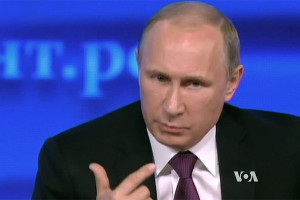Why Putin’s Next War Will Be at Home; A pollster and a former Putin adviser predict new popularity problems-and renewed focus on domestic enemies

(Bloomberg – bloomberg.com – Leonid Ragozin – April 17, 2015)
Vladimir Putin appeared this week in his annual marathon television broadcast to answer questions posed by viewers from across Russia. Of course, the four-hour show, Direct Line With Vladimir Putin, was carefully choreographed to avoid anything that could embarrass the Russian leader. But that doesn’t mean the broadcast shied away from criticism and thorny issues. Putin used this year’s broadcast to deliver a rebuke to his former finance minister, ruminate on the murder of opposition politician Boris Nemtsov, and opine on the war in Ukraine.
The show has become a yearly fixture dating back to 2001. Why has Putin embraced the call-in format? “It is the most powerful opinion poll,” he explained during Thursday’s show. “Millions of questions have been submitted via different channels, which allows us to get a realistic idea of what makes people worried.”
While Putin’s Russia is not a democracy, its leadership remains obsessed with feedback. Policies are shaped by frequent opinion polls and focus-group surveys. This helps explain some of the seemingly reckless and self-defeating moves made by the Kremlin, most of which miraculously result in high approval ratings and greater consolidation behind the regime.
Think back to January 2014, a time when Putin’s approval rating was at a record low of 65 percent (the sort of popularity that would be a high-water mark by the standards of more democratic countries). That all changed overnight following Russia’s occupation of Crimea. His approval rating shot to 88 percent and has remained more or less the same ever since. “One could expect some kind of a rise, but this result surprised everyone-Putin included,” says Gleb Pavlovsky, who served as Putin’s domestic policy adviser from 1999 to 2011.
A year after the seizure of Crimea, Putin’s ratings remain phenomenally high. Yet he now must contend sharply with the level of frustration caused by Russia’s economic downfall, exacerbated by Western sanctions and low oil prices. Lev Gudkov, the head of Levada Centre, an independent polling agency, predicts that before long, Putin’s approval ratings will start going down, too.
“The bubble of ideological patriotism is already quite weak. A relative calm in the Ukrainian conflict will give rise to protest sentiments in Russia,” Gudkov says. During the call-in show, Putin stressed that unity was vital for Russians: “If we keep the current level of consolidation in society,” he told the nation, “we will not be afraid of any threats.”
Gudkov believes Putin will soon need a fresh escalation to prevent the newly achieved unity from falling apart. But this escalation is unlikely to come in the form of a fresh attack on Ukraine or another neighbor. The takeover of Crimea was hailed by Russians exactly because it was relatively bloodless and welcomed by the majority of Crimeans. But the overall appetite for war is quite low, according to Gudkov.
“The system will be pressed into inventing a new emergency, but probably inside the country rather than outside, where it has already gone too far,” says Putin’s ex-adviser Pavlovsky. He sees Russia’s supposed imperialism as more of a PR bubble than a predominant ideology: “It is a show themed on the Cold War. It is a soap opera with empire-related props, not an imperial project.”
The new target will be those who are seen as agents of the external enemy: the relatively small but vocal and influential part of society that adheres to liberal values and favors integration with the West. Kremlin propaganda likes to refer to this group as a fifth column. “There will be more repression and more acts of provocation [against dissidents],” predicts Gudkov.
Although there isn’t yet repression on the Soviet scale in modern-day Russia, domestic tensions have been rising over the past few months. Some 30,000 Putin supporters marched through Moscow in February to demand that the government crush the “fifth column” and put opposition leaders behind bars. A week later came the death of Boris Nemtsov, an opposition leader, who was gunned down a few hundred feet from the Kremlin. Putin condemned the killing at the time and once again called it “a shameful act” during Thursday’s television broadcast.
In the months that followed, toxic anti-opposition rhetoric has filled TV airtime and pro-government newspapers as never before. The pressure from zealous officials and pro-Kremlin activists has reached past the political opposition to target theater directors and film distributors. On Friday, for example, Putin’s envoy who coordinates the army and law enforcement in Siberia accused the opposition of starting forest fires that have devastated dozens of villages in his region.
Putin hasn’t been immune to overheated rhetoric: Last month he claimed that Western secret services planned to use Russian political groups and nongovernmental organizations to disrupt next year’s national elections. He avoided this kind of talk during the call-in broadcast, instead welcoming the opposition to take part in the election and enter parliament.
Yet as he fielded question for nearly four hours, police raided the office of Open Russia, an NGO funded by former political prisoner Mikhail Khodorkovsky, which spreads information about repressions and protest actions.
Article ©2015 Bloomberg L.P. All Rights Reserved. Article also appeared at
bloomberg.com/news/articles/2015-04-17/why-putin-s-next-war-will-be-at-home
